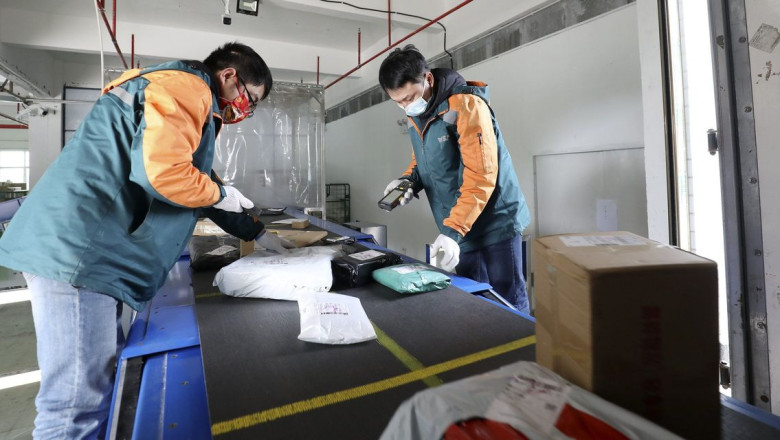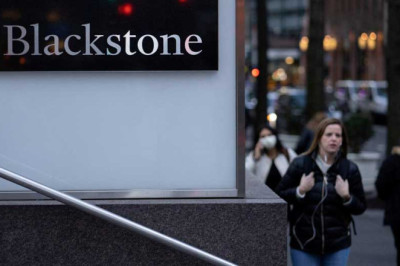
views
In China, if You’ve Got Mail, It Might Arrive With a Whiff of Sanitizer and a Covid-19 Test
Very little about daily life in China is untouched by the country’s zero-Covid policies. That includes the mail.
In many places, it goes through an extensive sanitization process, and those who receive letters and packages are often required to get tested for the virus.
After a worker at a postal distribution center in the eastern city of Hangzhou tested positive for Covid-19 in March, the company that operates the facility shut it down and the city sent hundreds of thousands of messages to those who had received deliveries asking them to get tested for the virus.
Ailly Gao, a 40-year-old graphic designer in the city, got one of the messages on her phone shortly after the arrival of two bouquets of Persian buttercup flowers, which she had ordered on a whim one night while watching a live-streaming social-media channel.
“I was a little nervous,” Ms. Gao said of taking the test. “What if I got unlucky?”
The positive case at the postal distribution center ended up rippling through Hangzhou, which is home to e-commerce giant Alibaba Group Holding Ltd. and a population that may be among the most dependent in the world on ordering goods online. Within 24 hours of sending the messages, the city conducted 260,000 Covid-19 tests.
Many were left waiting for their deliveries. One of Ms. Gao’s colleagues had ordered frozen sausages. When the delivery finally arrived, 11 days late, they were already defrosted, she said.
Ye Yu, a teacher, said a clay teapot he had ordered arrived at Hangzhou’s airport on March 12 and stopped moving. After waiting for two weeks, he started calling everyone he could think of to complain—including the delivery company, a local government office and a hotline for the city’s mayor. “How does this not affect the economy?” he asked.
China’s fight against Covid includes all kinds of tactics, from lockdowns that have kept people in Shanghai in their homes for weeks to the mass testing being conducted in Beijing. The precautions being taken with the mail are a part of a system that doesn’t leave anything to chance when it comes to Covid-19. Even China’s own health experts acknowledge the chances of getting infected from a piece of mail are extraordinarily low. The U.S. Centers for Disease Control and Prevention puts the risk of infection from a contaminated surface at less than 1 in 10,000.
Dali Yang, a professor at the University of Chicago who specializes in Chinese politics, said it wasn’t surprising to see Chinese officials using extensive systems, even when they carry substantial costs and the probability of catching the virus from a package is very low. The fact that many officials have been fired after Covid cases emerged on their watch might be motivating them to leave no perceived gaps in their defenses.
Pointing to mail as a source of infection also allows Chinese authorities to assign blame elsewhere when outbreaks occur. That has particularly been true when it comes to international mail. Since 2020, Chinese officials have cited imported products as a potential source of outbreaks. They have faulted American pork, Saudi shrimp and other imported frozen food as virus spreaders, leading to disputes with the U.S., EU and other governments.
“The emphasis on international letters and parcels carries the connotation that the virus is imported and foreign countries are the root cause of the pandemic,” said Lynette Ong, author of “Outsourcing Repression: Everyday State Power in Contemporary China.”
China’s National Health Commission, as well as authorities in Hangzhou, didn’t respond to requests for comment.
The public got a glimpse of the extensive efforts that go on behind the scenes when Shanghai authorities gave state media a tour of a postal distribution center in November after Singles Day—China’s annual online shopping event—when 320,000 pieces of mail poured into the center.
As mail trucks entered the site, staff wearing full-body protective gear sprayed the vehicle with sanitizer, paying special attention to the doors, handles and the cabin. The mail bags inside the trucks had already been sanitized at the airport cargo zone, according to the state media reports. But before they were unloaded from the truck at the postal distribution center, the bags went through another round of cleansing, which produced a smell so strong that the staff used two big fans to mitigate it.
The cleaned mail bags were then held in a sealed area for 24 hours before they were opened for sorting. After the wait, each package was placed on a conveyor belt for two more rounds of disinfection. Postal staff members picked up each package and sprayed the entire surface. After that, they waited another 24 hours before delivering. The center told the state media that all the staff lived on site, had been fully vaccinated and were tested regularly.
The State Post Bureau didn’t respond to requests for comment.
More precautions are taken when picking up mail. In the southern city of Shenzhen, J.P. Peng had to pick up baby cereal and teethers in March that she had ordered from the U.S. because the courier company stopped delivery services. She was required to get a negative Covid-19 test result before she could even enter the distribution center.
Once she got there, the staff told her she would have to wait two hours to retrieve her package—one hour for them to locate it, 30 minutes for spraying and another half-hour for them to hold it after sanitizing.
She didn’t have time to wait and had to return the next day to pick it up. She later vented her frustration over the process on China’s Twitter -like Weibo service, “What the hell?”
For many, the precautions have made getting mail and deliveries so inconvenient that they are now thinking twice about receiving them. In January, a woman in Shenzhen got a package containing KitKat bars and cosmetics from her boyfriend in Japan whom she hadn’t seen in two years because of the pandemic.
Within days, the health code on her phone flipped to warning yellow from green. Local officials called her to tell her it had changed because she had received international mail. After testing negative, she said she would still be willing to get packages from her boyfriend.
“But probably not any time soon,” said Koori, who asked to be identified only by her first name, adding jokingly: “I don’t want to cause more trouble for the medical personnel.”




















Comments
0 comment